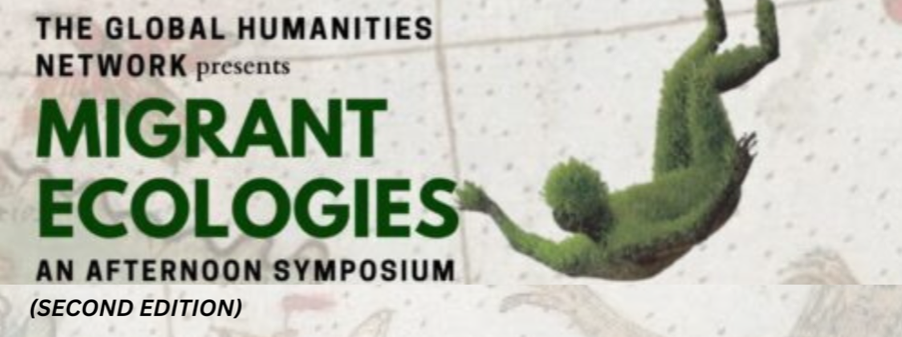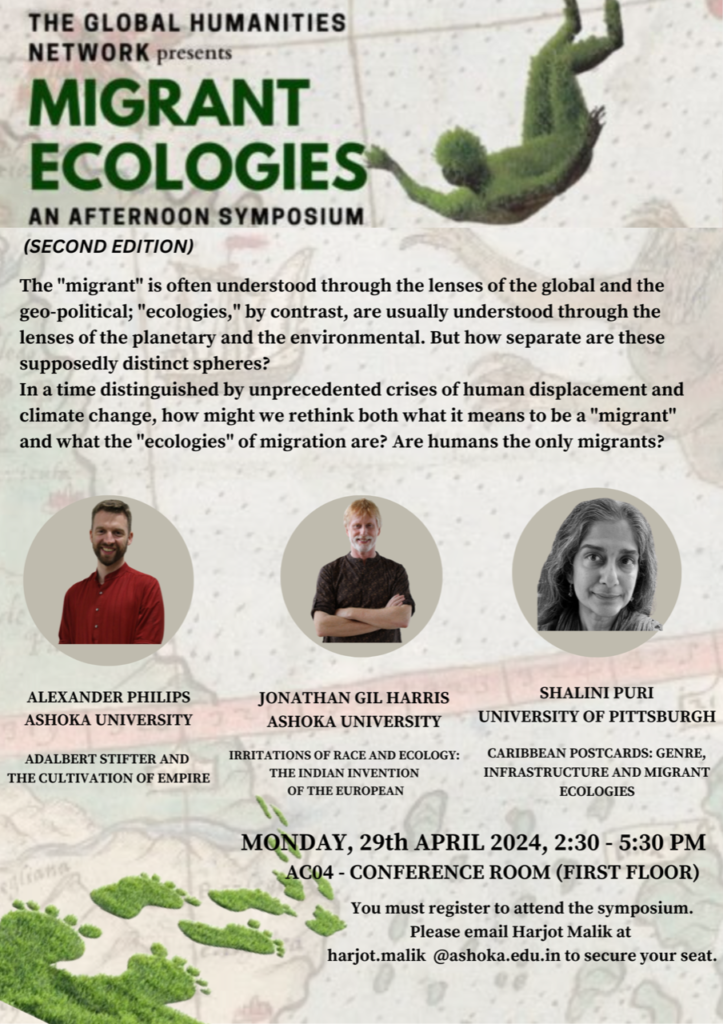


The “migrant” is often understood through the lenses of the global and the geo-political; “ecologies”, by contrast, are usually understood through the lenses of the planetary and the environmental. But how separate are these supposedly distinct spheres?
In a time haunted by unprecedented crises of human displacement and climate change, how might we rethink both what it means to be a “migrant” and what the “ecologies of migration” are? Are humans the only “migrants”?
We are delighted to announce that the second edition of the “Migrant Ecologies” symposium will be held next week on Monday April 29th, 2:30-5:00 pm in the Conference Room, AC04 First Floor.
The speakers will include Professor Shalini Puri of Pittsburgh University and also visiting Fulbright Fellow at Ashoka University, Professor Alexander Phillips of Ashoka University, and Professor Jonathan Gil Harris of Ashoka University. You can read the description of the symposium topic and the titles of their presentations in the flyer below.
Attendance at the symposium is limited to 25; all participants must pre-register to be admitted. (Registration is free.)
If you wish to attend, you must commit to being present for the full duration of the symposium from 2:30 to 5:30 pm (which will also include a break for tea and snacks).
To register, please email Harjot at [email protected]
Speakers:
Prof Jonathan Gil Harris (Ashoka University)
Jonathan Gil Harris is Professor of English at Ashoka University. He earned his Bachelors and Masters from Auckland University, and completed his DPhil from University of Sussex. Prior to coming to Ashoka, he was a Professor at George Washington University, where he taught since 2003. He has also held positions at Ithaca College, New York, and University of Auckland in New Zealand.
Professor Harris’ research interests include Shakespeare, including Indian adaptations, early modern English theatre, pre-colonial and colonial travel literature, medical history (especially understandings of illness and foreign bodies), early modern writing about India, medieval and early modern Silk Road cultures, and global Jewish history.
Professor Harris has published more than ten books on Shakespeare and early modern globalisation. He is currently working on a book project titled The Jewish Silk Road: Secrets of My Mother’s Tea Chest.
Professor Alexander Phillips (Ashoka University)
Alexander Phillips is Assistant Professor of English at Ashoka University. He holds a PhD in German Studies from Cornell University. He earned his Masters in German Studies from Cornell University and Bachelors in Comparative Literature and German Studies from the University of California, Irvine. He was a DAAD fellow at the Humboldt University in Berlin.
He is currently working on a book manuscript tentatively titled Poetics, Politics, and the Conquest of Nature: Ecology and German Realism. The book is an exploration of eco-aesthetic reflection in German-language literature from the second half of the nineteenth century. It argues that environmental degradation also drives the texts’ reflections on literature and art. Dr. Phillips’s work on ecology and literature has appeared in the journal Interdisciplinary Studies in Literature and Environment and the volume German Ecocriticism in the Anthropocene.
Like many other ecocritics, Dr. Phillips is unabashedly enthusiastic about exploring the real landscapes that are the subject of his reading and writing, preferably while perched on a bicycle saddle.
Dr. Phillips’s research interests include Ecocriticism and Environmental Humanities, Realist Literature and Theories of Realism, Frankfurt School and Critical Theory, and German Literature of the Nineteenth to Twenty-First centuries.
Professor Shalini Puri (Pittsburgh University)
Shalini Puri works on postcolonial and cultural studies of the global south with a focus on the Caribbean. Her research spans memory studies, environmental humanities, feminism, social movements, nationalism, indentureship and slavery, fieldwork, the arts, and everyday cultural practices. She is currently working on a project entitled “Poetics for Freshwater Justice: Postcards of the Caribbean Anthropocene.” Puri is also editor of the Palgrave Macmillan interdisciplinary, literary and cultural studies series “New Caribbean Studies,” which seeks to explore Caribbean self-understandings, to intervene in the terms of global engagement with the region, and to extend Caribbean Studies’ role in reinventing various disciplines and their methodologies well beyond the Caribbean. A founding member of the Pitt Prison Education Project, Puri is committed to diversifying the settings, methods, and reach of the humanities. She has taught Literature and Writing courses in which Pitt students and incarcerated students study together at a state prison.

